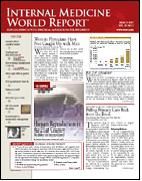Publication
Article
Internal Medicine World Report
Early Morning BP Spike Helped by Telmisartan
Early Morning BP Spike Helped by Telmisartan
PARIS—Treatment for 6 weeks with a fixed-dose combination of telmisartan/ hydrochlorothiazide (MicardisHCT; either 40 mg/12.5 mg, respectively [T40/H12.5], or 80 mg/12.5 mg, respectively [T80/H12.5]) provides significantly superior blood pressure (BP) reductions compared with losartan/hydrochlorothiazide (Hyzaar, L50/H12.5; 50/12.5 mg, respectively) in patients with mild-to-moderate essential hypertension, new data presented at the European Society of Hypertension meeting suggest. The significantly greater efficacy of telmisartan/hydrochlorothiazide was apparent over 24 hours and also during the last 6 hours of the dosing interval, a time period when a steep surge in BP is known to increase the rate of cardiovascular (CV) events.
The effects of the angiotensin II receptor blockers telmisartan and losartan in fixed-dose combination with hydrochlorothiazide were compared throughout the 24-hour dosing interval in 805 patients with mild-to-moderate hypertension. An overall significant (P = .004) treatment effect on the primary end point among the 3 active treatments was noted. Both telmisartan fixed-dose combinations showed a significant difference versus the losartan fixed-dose combination.
These results suggest that T40 or 80/H12.5 may be more effective at attenuating the morning BP hike, and, in turn, the risk of CV events.
Memantine Monotherapy Shows Promise for Early AD
PARIS—Memantine (Namenda), which is approved by the FDA for the treatment of moderate-to-severe AD, also is safe and effective for patients with mild-to-moderate Alzheimer’s disease (AD), investigators said at the Collegium Internationale Neuro-psychopharmacologicum (CINP) Congress.
In a study, 403 patients with a diagnosis of possible AD were been randomized to 24 weeks’ treatment with memantine, 20 mg/d (10 mg bid titrated up over a 4-week period), or placebo. Memantine-treated patients performed significantly better than patients receiving placebo on both the Alzheimer’s Disease Assessment Scale-cognitive subscale (P = .003) and the Clinician’s Interview-Based Impression of Change-Plus Caregiver Input (P = .004). Memantine, 20 mg/d, was safe and well tolerated, and the rate of adverse side effects was similar in the 2 treatment groups. These data suggest that memantine monotherapy may stabilize cognitive function or postpone further deterioration in early stages of AD.
Sertraline HCl and Venlafaxine XR Equally Effective in Major Depression
PARIS—The selective serotonin reuptake inhibitor (SSRI) sertraline HCl (Zoloft) is as effective as the serotonin norepinephrine reuptake inhibitor (SNRI) venlafaxine XR (Effexor XR) for treating patients with major depressive disorder (MDD), according to data presented at the CINP.
In an 8-week study, 163 outpatients with MDD were randomized to treatment with sertraline HCl, 50 to 150 mg/d, or venlafaxine XR, 75 to 225 mg/d, followed by a 2-week taper period. Results showed similar quality-of-life improvements in the sertraline HCl and venlafaxine XR groups as assessed by the Quality of Life Enjoyment & Satisfaction Questionnaire (16.8 ± 1.8 vs 17.5 ± 1.8; P = .74). Response rates were 71% in sertraline HCl-treated patients and 71% in venlafaxine XR-treated patients (P = .57). Response was defined as a reduction in Hamilton-Depression Rating Scale (HAM-D) scores of at least 50%. Remission rates (defined as a HAM-D total score of £7) were 60% and 54% in the 2 groups, respectively (P = .47).
